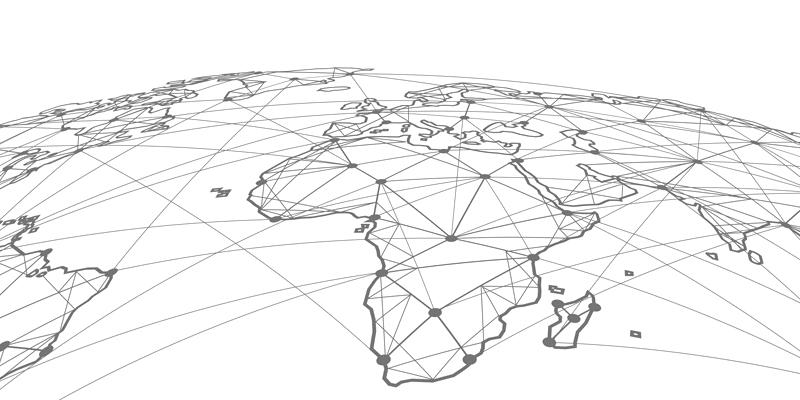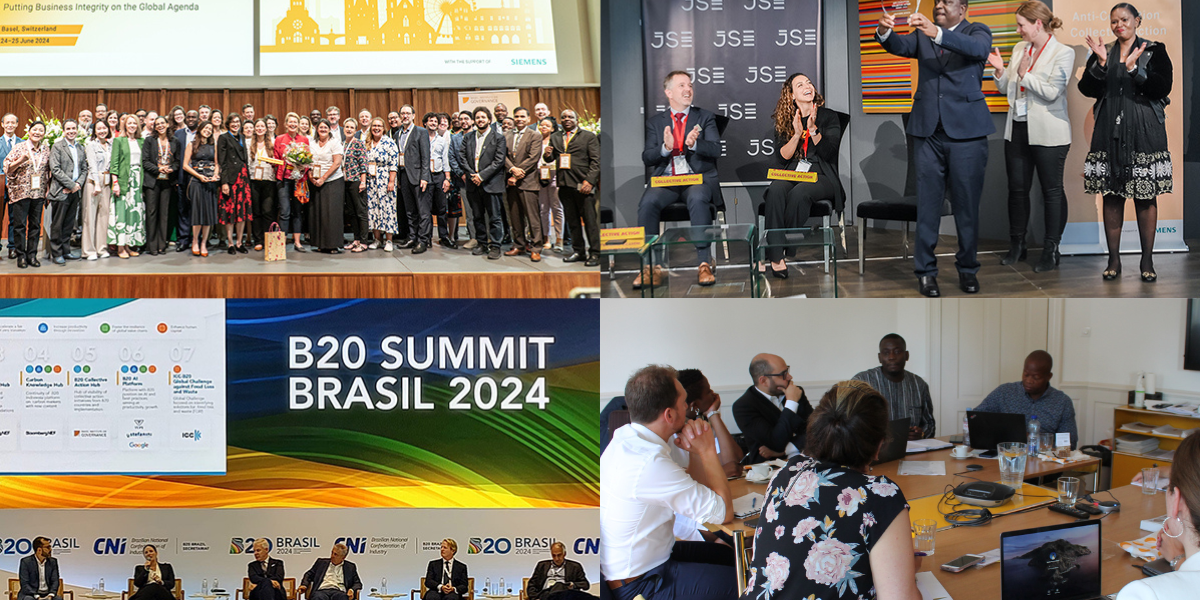Private Sector
Promoting ethical business through compliance and Collective Action
Our Private Sector team takes a dual approach to engaging and strengthening the private-sector response to corruption risks in business transactions: by advancing anti-corruption Collective Action, and through advice and technical assistance to private corporations and state-owned enterprises. It also hosts the B20 Collective Action Hub.
Collective Action
Collective Action is a collaborative approach to address corruption challenges and raise standards of integrity and fair competition in business. The Basel Institute has promoted Collective Action as an effective tool to prevent and combat corruption since its foundation in 2003.
Our team provides advice and resources on Collective Action to companies, business associations, NGOs and multi-stakeholder groups around the world. We also help to develop and facilitate Collective Action initiatives that bring together businesses and other stakeholders to, among other things:
- raise standards of integrity across industries locally and worldwide;
- develop best practice self-regulatory standards within specific industry sectors;
- solve systemic issues related to bribery and corruption;
- enhance conditions for fair competition and level the playing field between competitors.
Our approach is one of collaboration and sustained cooperation between stakeholders. We focus on developing pragmatic and business-oriented mechanisms that address specific problems affecting all concerned and that fit the context in which they need to work.
Compliance
Our team helps organisations to enhance their anti-corruption compliance programmes and organisational governance.
Our approach focuses on helping organisations to build a culture based on transparency, accountability, integrity and “speaking up” about corruption and bribery concerns. We support efforts to integrate anti-corruption compliance programmes into broader frameworks of risk management and sustainability.
News
Frequently asked questions
- What is anti-corruption Collective Action?
-
Anti-corruption Collective Action brings companies and other concerned stakeholders together to tackle shared problems of corruption, raise standards of business integrity and level the playing field between competitors.
It involves trust and a willingness to collaborate constructively. Both are often based on a sustained level of cooperation between stakeholders in the private and public sectors, civil society and international organisations.
Learn more about Collective Action and its variety of tools on the B20 Collective Action Hub, our global resource centre on anti-corruption Collective Action.
- Is Collective Action always about corruption?
-
No. In fact, Collective Action is a common term originating in economic theory as well as a number of other fields. It refers generally to multi-stakeholder collaboration to achieve shared goals.
The concept of Collective Action has long been used to describe multi-stakeholder efforts to address issues around sharing common resources, as well as sustainability. More recently it is being applied as a means to attain the sustainable development goals. Companies are keen to identify cross-cutting approaches that address corruption and other related issues of development and social justice, such as the prevention of human rights abuses in their operations.
Our focus is on anti-corruption Collective Action by, with and for the private sector. The approach has the potential to address corruption through mechanisms that are pragmatic and solution oriented. These types of challenges almost always affect entire groups of people, business sectors or markets.
- How does anti-corruption Collective Action fit into the work the Basel Institute?
-
Collective Action is fundamental to the Basel Institute’s wider mission to prevent and combat corruption and raise standards of governance. In fact, promoting and supporting Collective Action against corruption was a key objective of the Basel Institute when it was founded by Professor Mark Pieth in 2003.
Our team members regularly contribute their Collective Action expertise to cross-divisional projects. This is often the case when the Basel Institute is asked to support a partner country in a comprehensive manner, encompassing prevention and enforcement, and bridging public, business and other non-state actors.
- How does your team promote Collective Action?
-
Our team offers practical, independent guidance on how to use Collective Action to promote fair competition and tackle corruption risks. We support companies, governments and civil society organisations worldwide.
Our services include:
- A Helpdesk providing free advice on anti-corruption Collective Action.
- A Mentoring Programme, offering hands-on support to organisations working with the private sector on corruption issues.
- Active facilitation of Collective Action initiatives to maximise effectiveness and avoid antitrust issues.
- Tailored advice on how to set up, structure and manage Collective Action initiatives most effectively.
- Practical help in setting up sustainable public-private dialogue mechanisms to advocate for policy reforms.
- Guidance and outreach to relevant partners through our network of contacts in the field.
- What else does the team do?
-
As part of our general support to Collective Action approaches, we:
- Serve as a resource and knowledge centre on anti-corruption Collective Action initiatives and methodologies.
- Host and maintain the B20 Collective Action Hub and its collection of initiatives and practitioner resources.
- Host regular workshops and international conferences on Collective Action.
- Conduct research on the functioning and impact of Collective Action against corruption.
- Regularly speak at anti-corruption compliance and policy events raising awareness of Collective Action.
- Work with international policy institutions and national anti-corruption policy actors to promote the use of Collective Action among the private sector, including through the B20.
- What are some key projects and approaches?
-
Projects and approaches currently receiving a lot of attention include:
- Indicators of an effective anti-corruption programme, which establishes a first set of indicators that will evolve over time and with further Collective Action approaches.
- Synergies in human rights and anti-corruption compliance programmes, to make both aspects more effective and cost efficient.
- High Level Reporting Mechanisms to ensure fast, efficient resolution of reports of suspected unfair business practices in high-value public tenders.
- Integrity Pacts to promote transparency and integrity in public procurement and contracting.
- Local certification initiatives to ease due diligence burdens on SMEs and their multinational customers.
You can find information about these and much more on the B20 Collective Action Hub.
- What is the Basel Institute's track record in Collective Action?
-
We have a track record of over 20 years in promoting and initiating Collective Action against corruption. Together with partners, we have facilitated some of the world’s first and most innovative Collective Action initiatives, including the WEF Partnering Against Corruption Initiative, the Wolfsberg Group of Private Banks, and similar groups in the defence and metals technology industries.
We have provided advice and support to organisations and initiatives engaged in Collective Action in multiple countries, such as the Maritime Anti-Corruption Network (MACN), Alliance for Integrity and Banknote Ethics Initiative.
The topic of Collective Action gained greater international recognition in 2013, when the B20 group of business leaders mandated the Basel Institute to develop the B20 Collective Action Hub. Since then, our policy work has led to Collective Action being endorsed in high-level international forums and among standard-setters including the OECD in its revised Anti-Bribery Recommendation, the European Commission, the World Customs Organization, the B20, and the Special Session of the UN General Assembly against Corruption (UNGASS) among others.
National governments are increasingly including Collective Action as part of their national anti-corruption strategies, with our team's support.
- How is the Basel Institute's Collective Action work funded?
-
The Siemens Integrity Initiative has been an early and constant supporter of our work and Collective Action more generally. Our current and past projects have also received funding from a range of other private and public institutions such as the KBA NotaSys Fund, the UK Foreign, Commonwealth and Development Office (FCDO, formerly DFID), the Global Fund to Fight Malaria, TB and AIDS, and directly from some companies engaged in Collective Action initiatives.
- What kind of compliance assistance do you offer?
-
We offer tailor-made guidance to companies and organisations on how to:
- set up or enhance compliance programmes;
- address weaknesses in governance structures;
- integrate anti-corruption measures into risk management systems;
- align anti-corruption compliance with other ESG objectives;
- strengthen internal anti-corruption compliance;
- improve fair business conditions through Collective Action with other companies and stakeholders;
- assess the effectiveness of their anti-corruption compliance programmes through the review of their key performance indicators (KPIs) and the methodology applied to those KPIs.
This approach looks different for each organisation. Our services and training programmes are highly tailored to our clients’ specific needs, organisational make-up and set-up.
- What are common needs of the companies and organisations you work with?
-
Common guidance and advisory services include:
- benchmarking compliance programmes and identifying areas for improvement;
- strengthening third-party due diligence and supply chain risk management;
- conducting risk reviews and employee surveys;
- how to implement a reporting or whistleblowing mechanism;
- dealing with conflicts of interest and dilemma situations;
- how to implement best practices to meet the applicable national and international legal standards;
- supporting the development of Codes, policies and procedures that are relevant to the organisation’s specific requirements;
- creating custom-made training materials and delivering on-site training;
- strategic guidance on short- and long-term responses to corruption-related crises;
- developing and reviewing suitable KPIs for organisations to use to assess the effectiveness of their anti-corruption compliance programme
- how to engage in Collective Action and what it will contribute to fair business and the prevention of corruption in challenging markets;
- conducting investigations or reviewing investigations already carried out.



